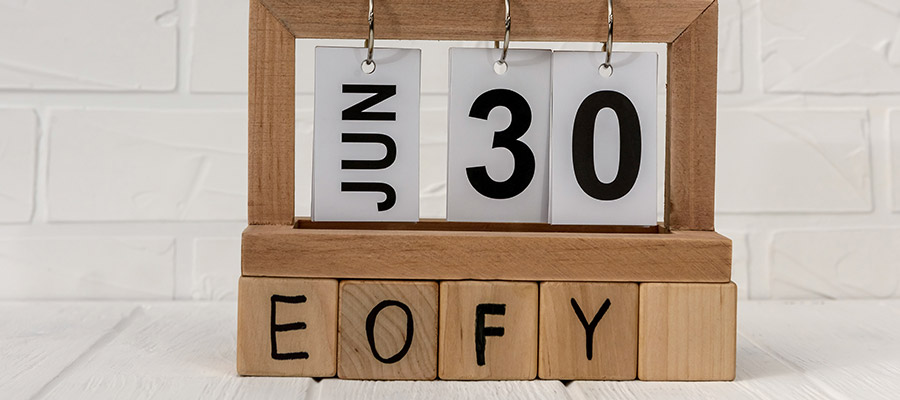2020 Tax Tips
By Andrew Dunbar | 02/06/2020

With almost all of us working from home in 2020, our tax deductions will look a little different this year. If you're working from home as an employee, it's important to know what you can claim and understand your options to make sure you get it right. It's also important to think about your tax plan holistically and consider avenues like super contributions and income protection insurance deductions.
Here are our tax tips for the 2019 – 2020 financial year.
Working from Home
What you can claim
If you are an employee working from home, as opposed to a business owner operating out of home, you are entitled to claim the proportion of your household and personal costs that were used to enable your usual work duties. The Australian Tax Office (ATO) defines this as an expense that is:
- Incurred by you
- Directly related to earning an income
- Documented – you must have a record to prove the cost was incurred
Work from home deductions typically apply to:
- Lighting, heating and cooling costs
- Cleaning costs for your dedicated workspace
- Depreciation and any repair costs for your furniture and your own office equipment
- Small equipment or furniture costs (less than $300), which can be written off in full
- Running expenses, such as printer ink or toner that was purchased by you
- Phone and internet expenses
What you can't claim
Employees working out of home are not eligible to claim any percentage of:
- Housing costs, such as rent, mortgage repayments or interest
- Equipment, consumables or other items that were provided by or paid for by your office, including any items you initially paid for, but were later reimbursed
- Household consumables, such as coffee, tea and biscuits that might ordinarily be provided at work
How to claim
To deal with the significant increase in work-from-home deductions, the ATO recently announced a short cut method to make claiming simpler. In 2020, you have two options for how you claim your expenses:
Claim a percentage of actual running costs
This is the traditional way of claiming, where you claim the percentage of your household costs, such as electricity, internet, cleaning, office consumables and technology purchases that were used for work purposes.
It can be quite onerous, as it involves calculating the actual time and resources used for your regular duties, including:
- Electricity: Calculating the exact number of hours worked from home and the amount of power used per hour, and then multiplying the hourly power usage cost by the number of hours worked
- Cleaning costs: Dividing your cleaning bill by the total floor space in your property to get a per square meter rate and then multiplying this by the amount of space used for your workstation
- Internet and phone: Calculating the exact cost of calls or data used in your work duties
With all of these areas, it’s important you also account for usage by other members of your household, so it can be quite a minefield. It may lead to the most accurate calculation, but it will require you to have extensive supporting documentation.
The Short Cut Method
The Short Cut Method announced recently allows you to claim $0.80c per hour worked from home, which covers off all of the expenses listed above, and only requires you to calculate the number of hours you worked from home.
This is the simplest method that requires keeping fewer records and is certainly less time consuming than calculating actual expenses. For most of us, it will likely be close to accurate, easier to document and less likely to be scrutinised. However, if your work is using a significant portion of your floor space, consuming large amounts of your data or running lots of appliances, it may be worth taking the long way around.
Documentation
As with any tax deduction, you need to be able to prove the expense. Should the ATO request documentation, you should be able to provide proof of hours worked – whether through formal timesheets or diary and calendar entries.
If you are not using the short cut method, you will need extensive documentation, including:
- Receipts for furniture or equipment purchases
- Itemised phone, electricity and internet bills
- Calendar entries for small purchases under ten dollars
To make the most of your deductions and protect yourself from scrutiny, it’s a good idea to review Working from Home During COVID-19 on the ATO website before completing your tax return.
Changes to your employment
If you have experienced changes to your employment or a reduction in your hours, it is likely that you have overpaid on tax and will receive a refund. The extra money will most likely be welcome, so get your return in on time to get access to the funds as soon as possible.
An important thing to note is that if you are receiving the Job Keeper payment, this counts as income and you will need to declare it.
Super contributions
If you are in a position to make contributions to your superannuation and you haven’t reached the $25,000 cap, doing so before 30 June can be a great way to reduce your tax liability and grow your retirement savings.
For those that earn under $53,564 and meet the eligibility criteria, the Australian Government will match super contributions up to $500, helping your super grow faster.
If your spouse is a low-income earner, you can also make a spousal contribution and receive a tax offset.
Income protection insurance
With the income concerns raised by COVID-19, many people are reconsidering their income protection, but what many don’t realise is that personal income protection insurance can be tax deductable. You can also prepay for twelve months before 30 June and claim it on your current year's return.
Whether you are working from home, have undergone employment changes or are continuing on as usual, it's important to start planning your tax before 30 June. For more advice on deductions and navigating your options, you can view all our tax tips here.
General Advice warning
The information provided in this blog does not constitute financial product advice. The information is of a general nature only and does not take into account your individual objectives, financial situation or needs. It should not be used, relied upon, or treated as a substitute for specific professional advice. Apt Wealth Partners (AFSL and ACL 436121 ABN 49 159 583 847) and Apt Wealth Home Loans (powered by Smartline ACL 385325) recommends that you obtain professional advice before making any decision in relation to your particular requirements or circumstances.









